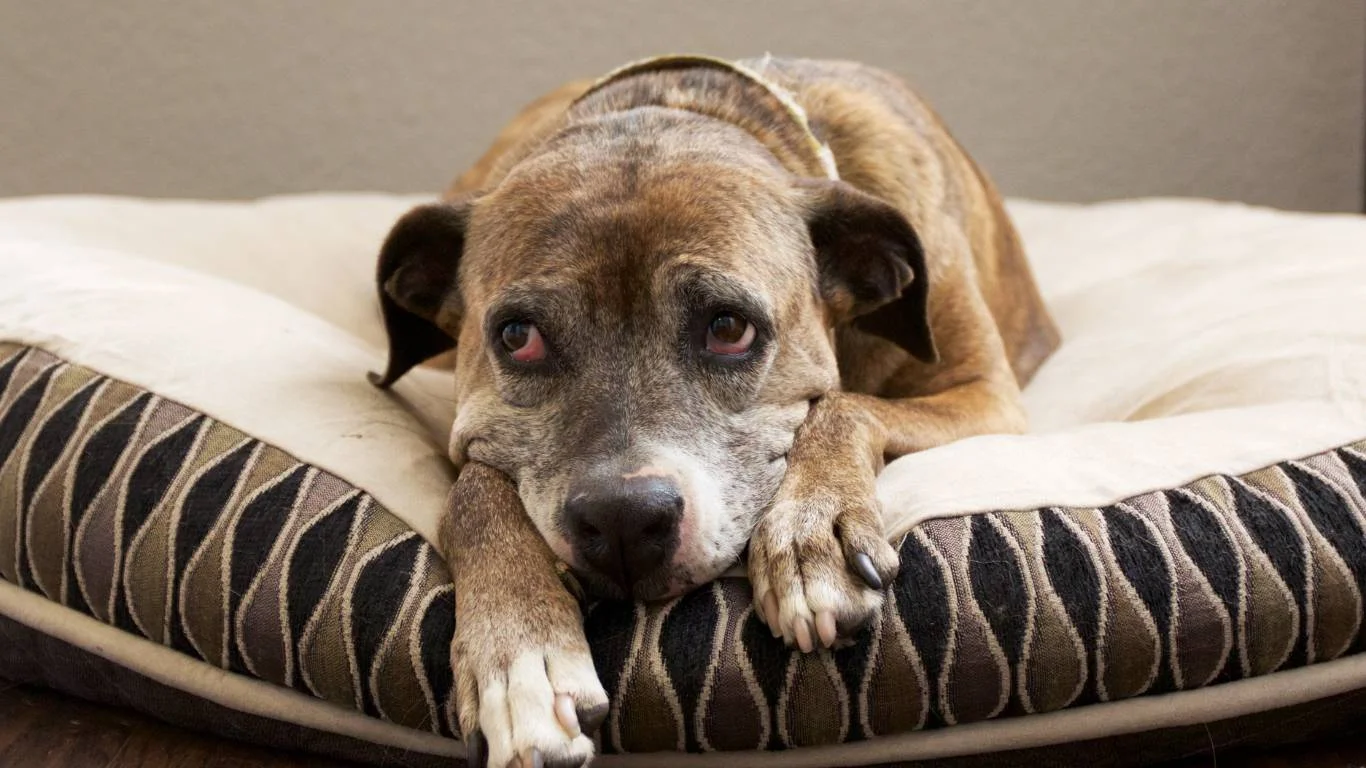Why Does My Dog Shake Their Head So Much? Find Out Why and How to Help
If you’re a dog parent, you’ve probably seen your dog shaking their head from time to time, whether it’s after a bath, during playtime, or even for no apparent reason. But have you ever wondered, “Why does my dog shake their head so much?” It’s actually a question I hear a lot from pet owners, especially when it’s happening more frequently than usual. As a Veterinary Assistant with a focus on nutrition, I’ve seen this behavior in a variety of dogs, and it can sometimes indicate a deeper issue. In this article, we’ll dive into the different reasons why your dog might be shaking their head, from simple irritations to more serious health concerns. Whether it’s ear infections, allergies, or something else entirely, understanding the cause is key to helping your dog feel better and ensuring their overall well-being.
Common Causes of Head Shaking in Dogs

Head shaking in dogs can happen for a variety of reasons, some of which are relatively harmless, while others may require veterinary attention. As a veterinary assistant, I’ve seen many pet owners initially panic when they notice their dog shaking its head more than usual. However, not every instance of head shaking is a cause for alarm. Let’s look at some common reasons for this behavior:
1. Ear Infections
One of the most frequent causes of head shaking in dogs is an ear infection. When a dog has an infection in its ear, whether it’s bacterial, yeast, or fungal, it can cause discomfort and irritation. The dog may shake its head in an attempt to relieve that discomfort. Sometimes, the infection might also cause a foul odor or discharge coming from the ear, which is a telltale sign of an issue. If you notice any signs of ear infection along with head shaking, it’s important to get your dog checked out by a vet to avoid complications.
2. Allergies

Just like humans, dogs can suffer from allergies, and these can lead to head shaking. Dogs can be allergic to a variety of things, including pollen, dust mites, mold, and certain foods. When a dog’s body reacts to an allergen, it can cause inflammation in the ears or the skin around the ears, leading to itching and irritation. Head shaking is often a way for your dog to try to relieve this itchiness. If allergies are the culprit, you might also notice other signs like paw licking, red or watery eyes, or constant scratching.
3. Foreign Objects in the Ear
Sometimes, dogs shake their heads simply because something is stuck in their ear. This could be anything from a grass seed to a tiny pebble or even a small insect. If your dog has been running through tall grass or playing outside, it’s not uncommon for foreign objects to get lodged in their ears. This can cause discomfort, and your dog will likely shake their head in an attempt to dislodge the object. If you suspect something is stuck in your dog’s ear, it’s important to check their ear canal or seek veterinary help to safely remove it.
4. Wax Buildup
Just like humans, dogs can also experience a buildup of earwax. While a little wax is normal, an excess can lead to discomfort and head shaking. Sometimes, the wax can trap bacteria, creating a perfect environment for infections to develop. If you notice that your dog has been shaking their head more frequently and you also observe dark wax or a discharge coming from the ear, it’s worth having their ears cleaned by a vet. Regular ear cleaning can help prevent this issue from becoming more serious.
5. Neurological Issues

In more rare cases, persistent head shaking may be a sign of a neurological problem. Conditions such as vestibular disease or other balance disorders can cause a dog to shake their head in an attempt to stabilize themselves. If your dog is also showing signs like dizziness, loss of coordination, or tilting their head to one side, it’s important to get them evaluated by a vet immediately. These types of conditions can be serious and require medical treatment.
When Should You Be Concerned About Head Shaking?
It’s not always easy to tell when head shaking is simply a harmless behavior or a sign of something more serious. Here are some red flags that should prompt you to take your dog to the vet:
- Frequent and persistent head shaking that lasts more than a few days.
- Discharge or odor coming from the ears.
- Signs of pain, such as your dog whining or flinching when their ears are touched.
- Head tilting, loss of balance, or dizziness.
- Swelling or redness in the ears.
If you notice any of these signs in addition to the head shaking, it’s a good idea to visit your vet for a thorough checkup. Early diagnosis and treatment can help prevent any issues from escalating and ensure your dog remains comfortable and healthy.
Treatments and Solutions for Head Shaking in Dogs

Once you’ve identified the cause of your dog’s head shaking, it’s time to explore the possible treatments. The right solution depends on the underlying issue, but there are several steps you can take to help relieve your dog’s discomfort and prevent future occurrences. In my experience, it’s always best to consult a vet to get a professional diagnosis, but here are some common treatments that can help address the most frequent causes of head shaking:
1. Treating Ear Infections
If your dog has an ear infection, your vet will likely recommend a course of treatment that includes medicated ear drops or ointments to address the infection and reduce inflammation. Depending on whether the infection is bacterial or fungal, the treatment plan may vary. In more severe cases, oral antibiotics or antifungal medications may be prescribed. I’ve seen how effective these treatments can be in clearing up infections and stopping the head shaking. If your dog has chronic ear infections, your vet might also recommend routine ear cleaning to help prevent future problems.
2. Managing Allergies

For dogs suffering from allergies, the first step is identifying the allergen, which can sometimes be a bit tricky. Your vet may suggest an allergy test to determine what’s causing the problem, or they may recommend a trial elimination diet if food allergies are suspected. Once the allergen is identified, managing the condition typically involves allergy medications such as antihistamines or corticosteroids. Some dogs may also benefit from regular ear cleaning to remove allergens that may be trapped in the ear canal. Over-the-counter ear cleansers can help reduce irritation and inflammation.
In cases where environmental allergens are the problem, minimizing exposure can go a long way. For example, during peak allergy seasons, try to keep your dog indoors during the early morning and late evening when pollen levels are highest. Also, regular baths can help remove pollen and dust from your dog’s coat, which might help reduce the allergic response.
3. Removing Foreign Objects
If your dog’s head shaking is caused by a foreign object stuck in their ear, the best solution is to safely remove the object. While it might be tempting to try and do this yourself, I always recommend having a professional handle it. It’s easy to accidentally push the object deeper into the ear canal, making the situation worse. Your vet will have the right tools and techniques to gently remove the object without causing injury. If your dog has been shaking their head vigorously due to a foreign object, they may also be prescribed an ear cleanser or ointment to soothe the ear canal after the object is removed.
4. Addressing Wax Buildup

If excessive earwax is the culprit behind your dog’s head shaking, regular ear cleaning can help alleviate the discomfort. I’ve found that many pet owners overlook ear cleaning, but it’s an essential part of your dog’s hygiene routine, especially for breeds that are prone to ear issues. Your vet can show you the correct way to clean your dog’s ears using a gentle ear cleaner. It’s important to use the right products, as harsh chemicals or excessive cleaning can irritate the ear canal.
In addition to cleaning, your vet might recommend ear drops to soften the wax and help it naturally work its way out of the ear canal. If your dog has recurring issues with wax buildup, your vet may also suggest a more frequent cleaning schedule to keep things under control.
Preventing Future Head Shaking Issues
Now that we’ve covered the main causes and treatments for head shaking in dogs, you might be wondering what you can do to prevent this behavior from happening in the future. While some causes of head shaking, like allergies or infections, can’t always be entirely avoided, there are a few proactive steps you can take to reduce the chances of it happening again:
1. Regular Vet Checkups
One of the best ways to prevent head shaking issues is by keeping up with regular vet checkups. As a veterinary assistant, I’ve seen how early intervention can make a big difference in preventing serious ear problems. Your vet can monitor the health of your dog’s ears and catch potential issues before they become more serious. Regular checkups also provide an opportunity for your vet to give your dog an overall health assessment and recommend any preventive treatments.
2. Ear Care for Long-Eared Breeds
If you have a breed with long ears, like a Cocker Spaniel or Basset Hound, your dog might be more prone to ear infections due to the way their ears trap moisture and debris. In these cases, more frequent ear cleaning is essential. I’ve worked with many owners of long-eared breeds, and one tip I always give them is to dry their dog’s ears thoroughly after baths or swims. Moisture left in the ear can quickly turn into a breeding ground for bacteria and yeast, leading to infections that cause head shaking.
3. Avoid Irritants
If allergies are a known problem for your dog, avoiding irritants is key. As mentioned earlier, keeping your dog indoors during allergy season and using allergy-friendly products can help minimize their exposure to allergens. You can also invest in air purifiers for your home to help reduce dust and pollen levels. For dogs with food allergies, working closely with your vet to select the best diet for them can significantly reduce the frequency of allergic reactions and the associated head shaking.
4. Healthy Diet and Supplements
A healthy diet plays an important role in your dog’s overall well-being, including their ear health. Providing a balanced, high-quality dog food that meets their nutritional needs can help boost their immune system and reduce the chances of infections and inflammation. Additionally, some dog owners have found that adding certain supplements, like omega-3 fatty acids, can help reduce inflammation and promote healthy skin and coat, which can indirectly improve ear health.
Ultimately, the key to preventing head shaking in dogs is paying attention to their behavior and taking a proactive approach to their health. By keeping an eye on their ears, managing allergies, and providing regular vet visits, you’ll help ensure your dog’s ears stay healthy and free from discomfort.
When to Seek Professional Help for Your Dog’s Head Shaking

While some occasional head shaking is normal, there are times when it’s crucial to seek professional help. As much as we love our dogs, there are moments when what seems like a simple behavior could be a sign of something more serious. In my years as a Veterinary Assistant, I’ve worked with many pet owners who were unsure about when to worry. So, let’s break down the situations where professional help should be your next step.
1. Persistent or Severe Head Shaking
If your dog is shaking their head continuously for several hours or days, it’s time to get them checked by a vet. A single head shake here and there is usually nothing to worry about, but if it’s persistent or gets worse over time, something might be irritating their ears or causing them pain. Head shaking due to an ear infection, for instance, can cause further damage to the ear if left untreated, leading to even more serious issues like hearing loss.
2. Presence of Discharge or Odor
One of the most common signs of an ear infection or other ear issue is a foul-smelling discharge coming from your dog’s ears. If you notice anything unusual, such as a yellow or brown discharge, or if your dog’s ears smell sour, it’s time to schedule a vet visit. Infections, whether bacterial or fungal, require medical treatment to prevent them from spreading or causing long-term damage. Your vet will be able to clean your dog’s ears and prescribe the appropriate medication to treat the infection.
3. Head Tilt or Loss of Balance

If your dog is not only shaking their head but also tilting it to one side or showing signs of imbalance, there could be a more serious issue at play. Vestibular disease, a disorder affecting the inner ear and balance, can cause these symptoms. It may appear suddenly, and dogs with vestibular disease often have trouble walking or standing, and their eyes may move uncontrollably. If this happens, get your dog to the vet right away. Vestibular disease is typically treatable, but early intervention is crucial.
4. Pain or Sensitivity Around the Ears
Dogs can’t tell us where it hurts, but they do have ways of letting us know. If your dog is shaking their head and also seems to be in pain when you touch their ears, this could indicate an ear infection, injury, or a foreign object lodged in their ear canal. You may also notice that your dog is scratching or rubbing their ears more than usual. If these signs appear, it’s important to visit the vet for a thorough examination to avoid worsening the condition.
5. Chronic Head Shaking or Ear Problems
If your dog has a history of frequent ear infections or chronic head shaking, it could be a sign of an ongoing issue, such as allergies, mites, or even an autoimmune condition. In these cases, a vet will likely conduct tests to get to the root of the problem. They might recommend changes in diet, medication, or even allergy testing to pinpoint the cause. For dogs with recurring ear problems, maintaining a regular ear cleaning routine and following a treatment plan designed by your vet can help prevent further issues.
Helpful Resources for Dog Owners
If you’re looking for more information on your dog’s health and well-being, here are some great resources to check out:
- American Kennel Club (AKC) – Offers valuable articles on dog breeds, training, health, and more.
- PetMD – A trusted resource for pet health and medical advice.
- National Institutes of Health (NIH) – Provides research and information on health and medical conditions that could affect your pet.
- Health.com – A comprehensive source for general health advice that can sometimes apply to your pet’s well-being too.
Disclaimer
While I’ve provided general information based on my experience as a Veterinary Assistant, this article is not a substitute for professional veterinary care. Every dog is unique, and the causes of head shaking can vary widely from one case to another. If your dog is showing signs of head shaking or any other concerning symptoms, it’s always best to consult with your veterinarian for an accurate diagnosis and tailored treatment plan. Early detection of potential health issues can make a big difference in your dog’s quality of life and longevity.
As dog parents, we all want the best for our furry friends. By staying informed and keeping an eye on their health, you can help ensure your dog leads a happy and comfortable life. And remember, whether it’s a simple ear cleaning or a more complex health issue, your vet is always there to help guide you through the process. Don’t hesitate to reach out if you’re ever unsure about your dog’s health!






